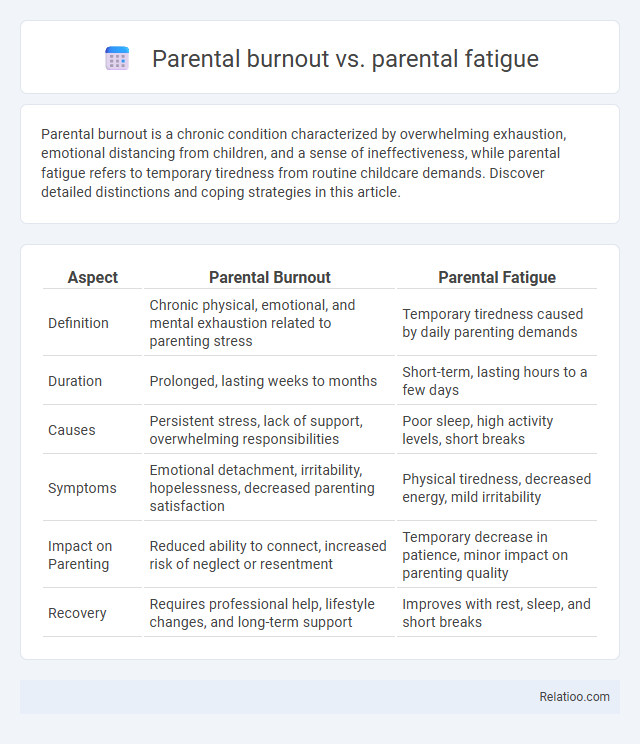Parental burnout is a chronic condition characterized by overwhelming exhaustion, emotional distancing from children, and a sense of ineffectiveness, while parental fatigue refers to temporary tiredness from routine childcare demands. Discover detailed distinctions and coping strategies in this article.
Table of Comparison
| Aspect | Parental Burnout | Parental Fatigue |
|---|---|---|
| Definition | Chronic physical, emotional, and mental exhaustion related to parenting stress | Temporary tiredness caused by daily parenting demands |
| Duration | Prolonged, lasting weeks to months | Short-term, lasting hours to a few days |
| Causes | Persistent stress, lack of support, overwhelming responsibilities | Poor sleep, high activity levels, short breaks |
| Symptoms | Emotional detachment, irritability, hopelessness, decreased parenting satisfaction | Physical tiredness, decreased energy, mild irritability |
| Impact on Parenting | Reduced ability to connect, increased risk of neglect or resentment | Temporary decrease in patience, minor impact on parenting quality |
| Recovery | Requires professional help, lifestyle changes, and long-term support | Improves with rest, sleep, and short breaks |
Understanding Parental Burnout: Definition and Signs
Parental burnout is a state of physical, emotional, and mental exhaustion caused by prolonged and intense parenting stress, distinct from general parental fatigue, which is temporary tiredness from daily parenting demands. Signs of parental burnout include chronic exhaustion, detachment from your child, and feelings of ineffectiveness or hopelessness in parenting roles. Understanding these symptoms can help you recognize when parenting stress goes beyond fatigue and requires intervention or support.
What is Parental Fatigue? Key Characteristics
Parental fatigue is a state of physical and emotional exhaustion caused by the demands of parenting, characterized by constant tiredness, irritability, and difficulty concentrating. Unlike parental burnout, which involves overwhelming feelings of detachment and helplessness, parental fatigue mainly results from sleep deprivation and continuous caregiving tasks. Understanding your parental fatigue helps identify early signs before progressing to more severe conditions like parental burnout.
Parental Burnout vs Parental Fatigue: Core Differences
Parental burnout and parental fatigue both involve exhaustion, but parental burnout is a prolonged state marked by emotional detachment and feelings of inefficacy in parenting roles, whereas parental fatigue is temporary tiredness that typically resolves with rest. You may experience parental fatigue after a long day or short period of stress, but parental burnout reflects chronic stressors that overwhelm coping mechanisms. Understanding these core differences is crucial for addressing your mental health and seeking appropriate support.
Causes of Parental Burnout in Modern Families
Parental burnout in modern families stems from chronic stress due to high parenting demands, lack of social support, and unrealistic societal expectations. Persistent exhaustion and emotional detachment characterize parental fatigue but do not include the severe emotional and physical exhaustion found in parental burnout. Factors such as work-life imbalance, continuous caregiving without respite, and digital distractions contribute significantly to the causes of parental burnout today.
Common Triggers for Parental Fatigue
Parental fatigue often results from continuous sleep deprivation, overwhelming caregiving responsibilities, and lack of personal time, which gradually erode your energy and patience. Unlike parental burnout, characterized by emotional exhaustion and detachment from parenting roles, parental fatigue is primarily physical and can be alleviated with rest and support. Recognizing stressors like multitasking demands and insufficient help is crucial to prevent parental fatigue from escalating into full burnout.
Psychological and Emotional Impacts
Parental burnout manifests as overwhelming exhaustion, emotional distancing, and reduced efficacy in caregiving, often leading to severe psychological distress and symptoms of depression or anxiety. Parental fatigue, while also characterized by tiredness, typically involves less severe emotional depletion and maintains a functional level of engagement and attachment with children. The psychological and emotional impacts of parental burnout are more profound, including chronic stress, feelings of helplessness, and a disrupted parent-child bond, whereas parental fatigue tends to be transient and resolves with rest and support.
Physical Symptoms: Burnout vs Fatigue
Parental burnout manifests through severe physical symptoms like chronic exhaustion, headaches, muscle pain, and significant sleep disturbances, indicating a deeper level of stress than parental fatigue. Parental fatigue primarily causes temporary tiredness and general low energy that improves with rest, while burnout involves a prolonged depletion of physical and emotional resources. You should recognize that parental burnout requires more intensive intervention to restore your physical health compared to the more manageable impacts of fatigue.
Long-term Consequences on Family Dynamics
Parental burnout results in emotional exhaustion, reduced parental efficacy, and detachment from children, causing long-term disruption in family dynamics and weakening parent-child bonds. Parental fatigue, characterized by temporary physical and mental exhaustion, may affect day-to-day interactions but typically shows fewer lasting effects on family relationships. Persistent parental burnout can lead to increased risks of child behavioral issues, impaired family cohesion, and strained spousal relationships, highlighting the critical need for early intervention and support.
Effective Strategies to Manage Burnout and Fatigue
Parental burnout, distinct from parental fatigue, involves chronic emotional exhaustion, while fatigue is more temporary physical tiredness. Effective strategies to manage burnout and fatigue include setting realistic expectations, seeking social support, prioritizing self-care, and establishing consistent routines. You can also benefit from mindfulness practices and professional help to regain emotional balance and improve overall well-being.
When to Seek Professional Help
Parental burnout differs from parental fatigue by its intense emotional exhaustion, feelings of detachment from your children, and reduced sense of accomplishment, which persist even after rest. When your stress escalates to overwhelming hopelessness, chronic irritability, or impairments in daily functioning, it signals the need to seek professional help from mental health specialists. Addressing these symptoms early with therapy or counseling improves coping strategies and supports your long-term well-being and parenting effectiveness.

Infographic: Parental burnout vs parental fatigue
 relatioo.com
relatioo.com